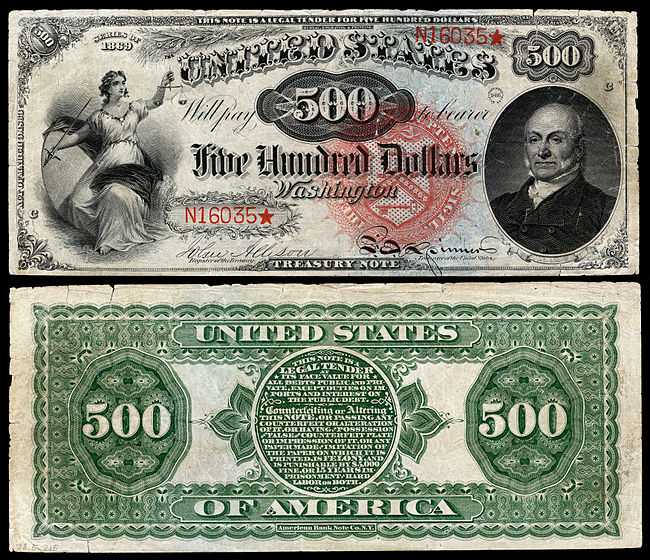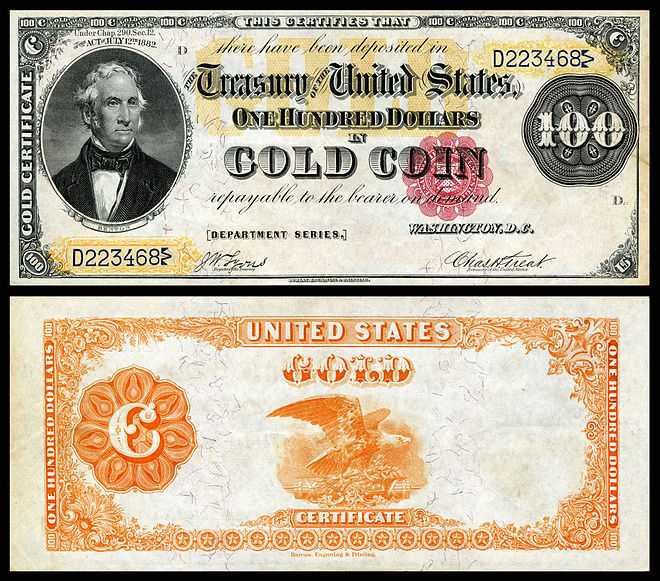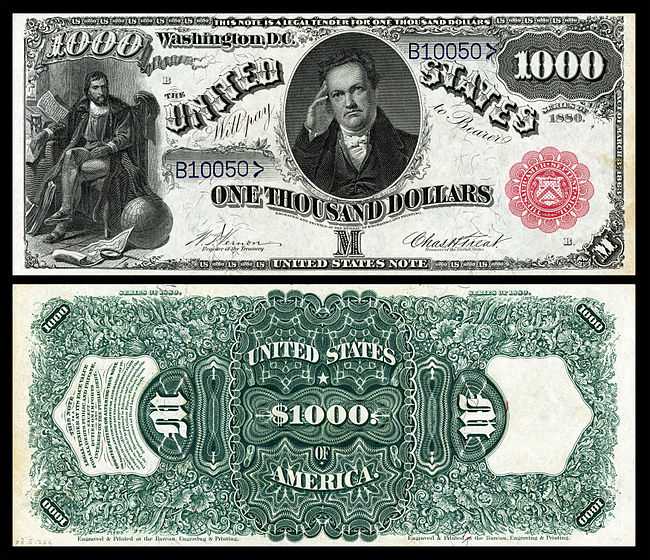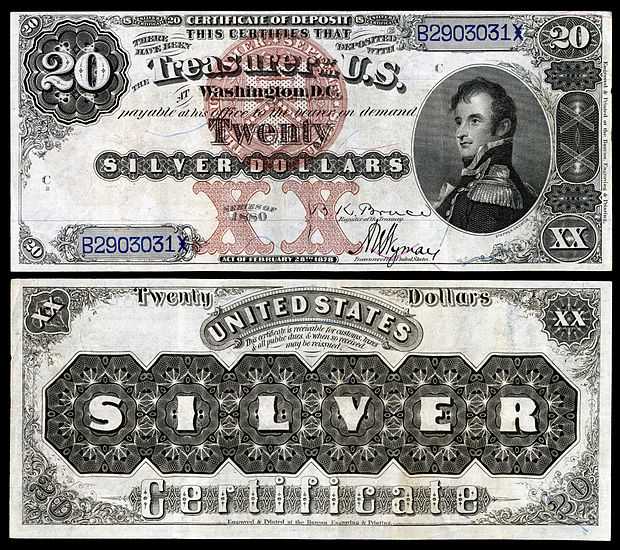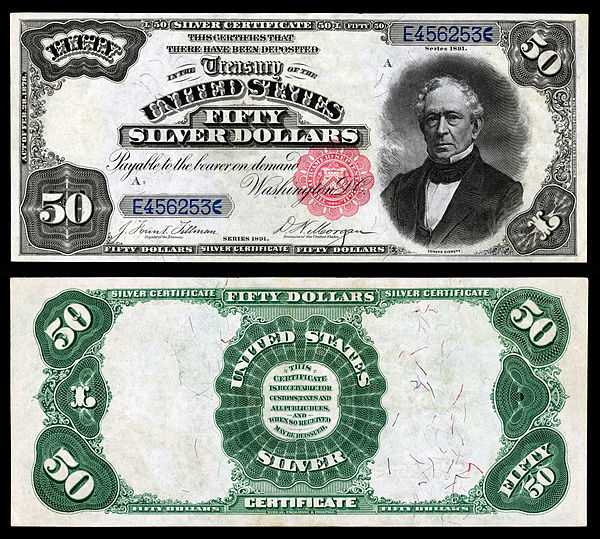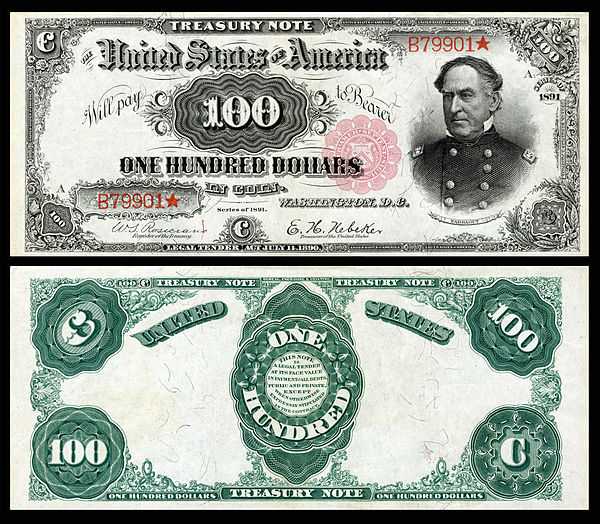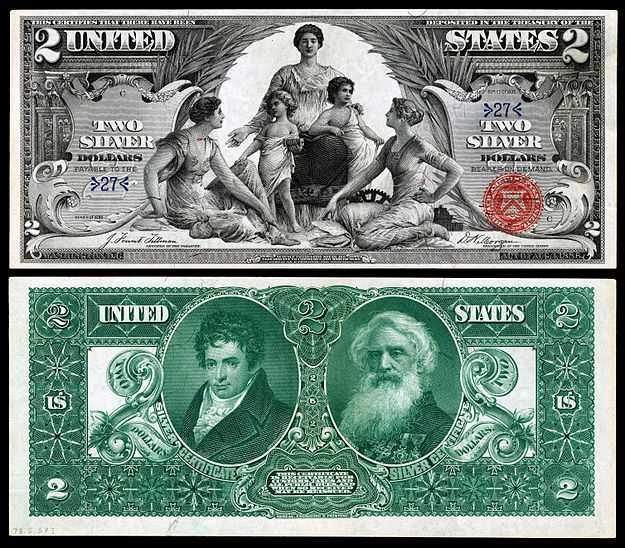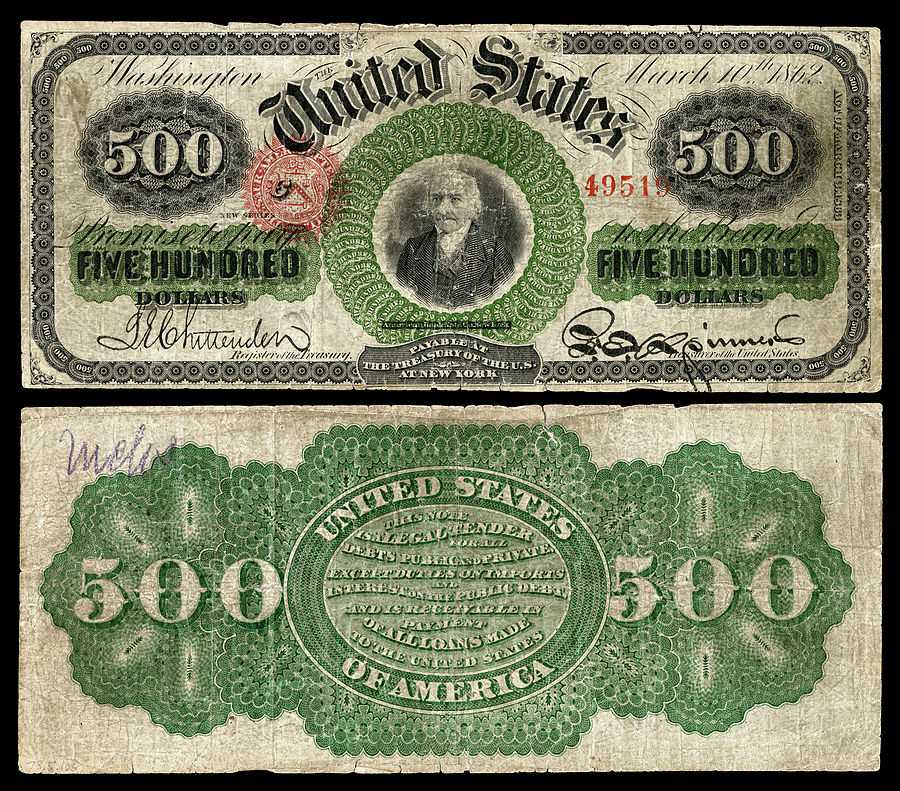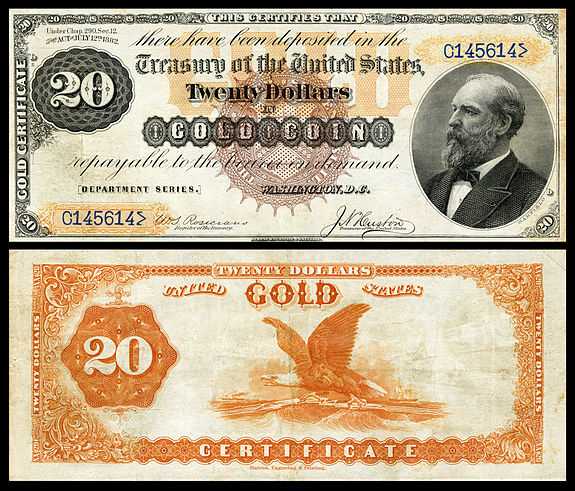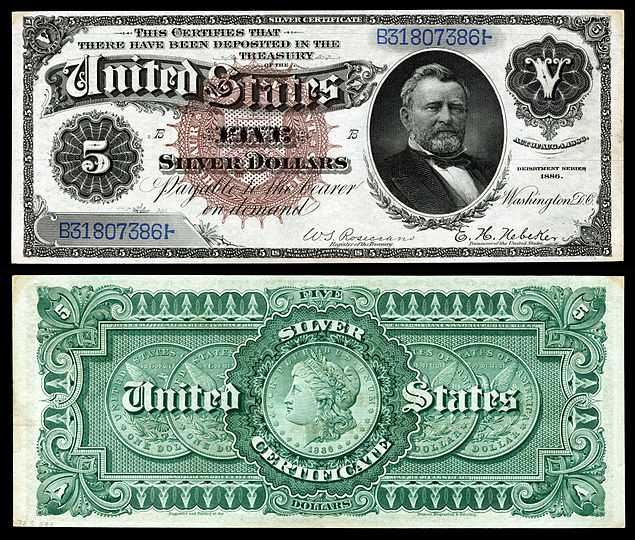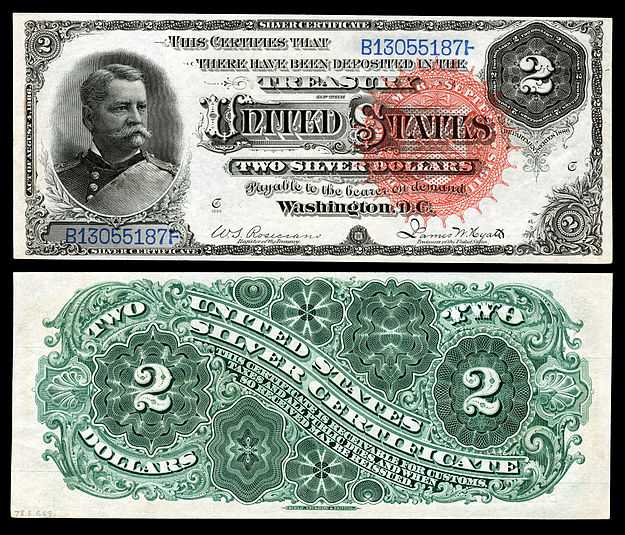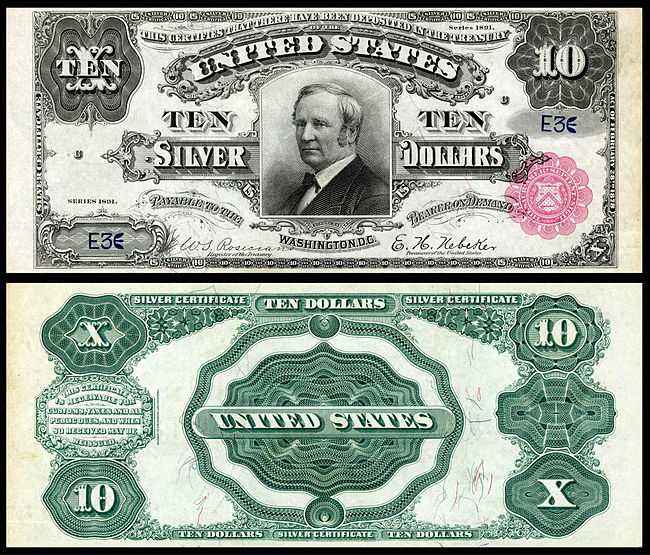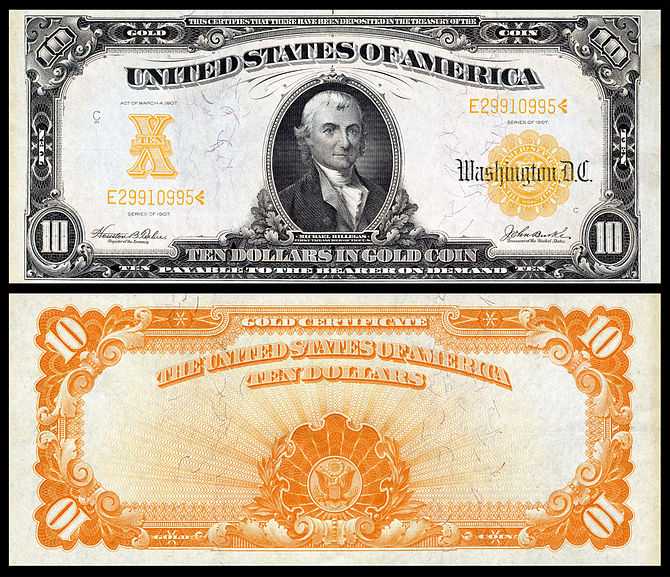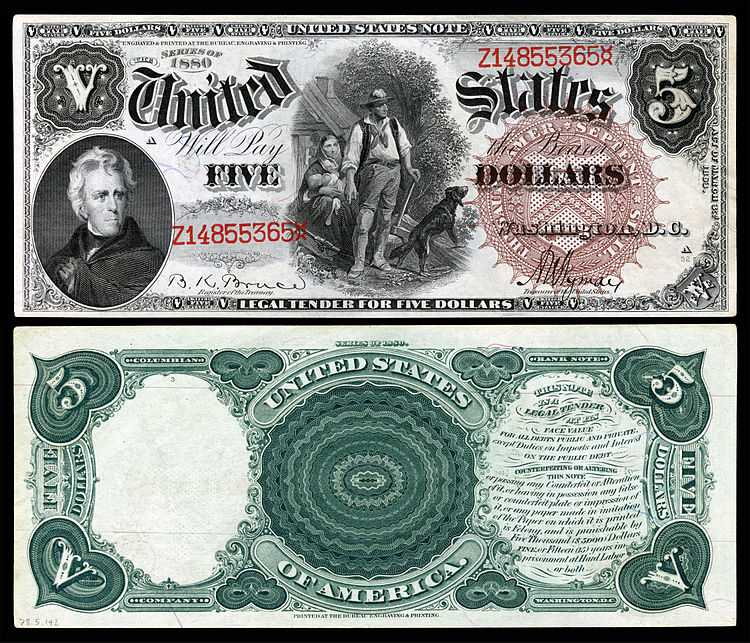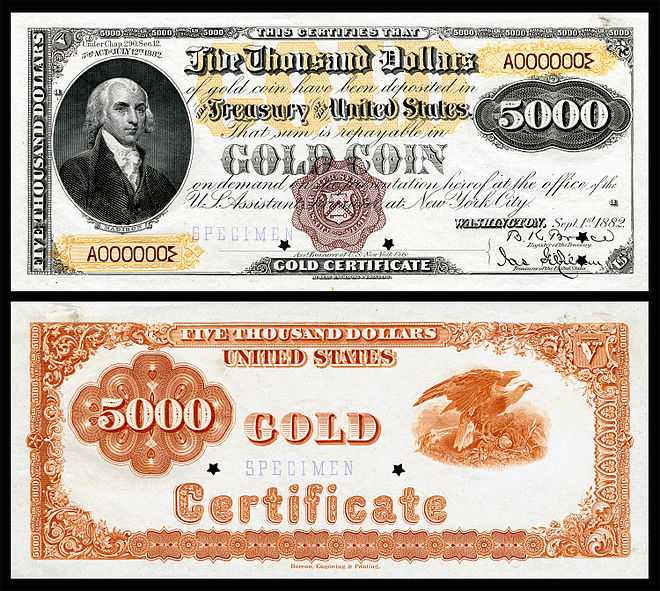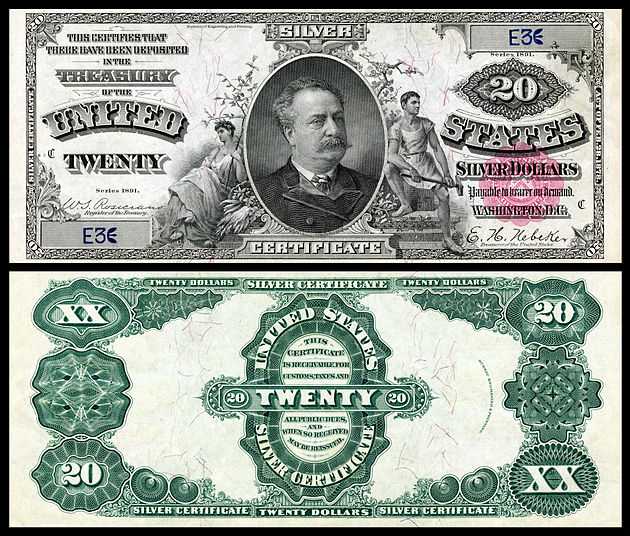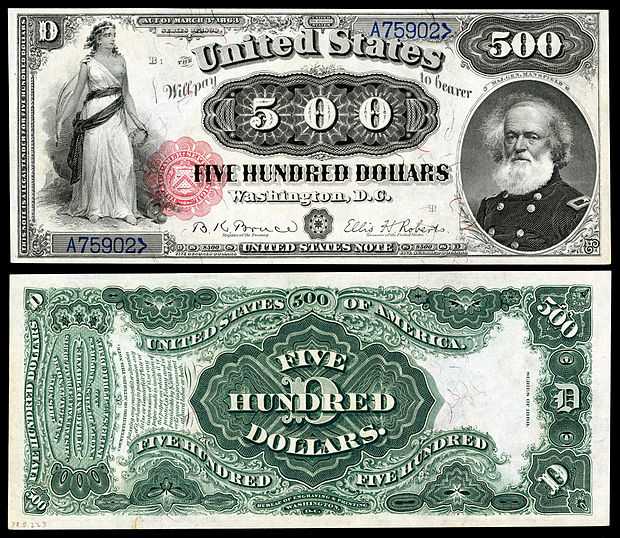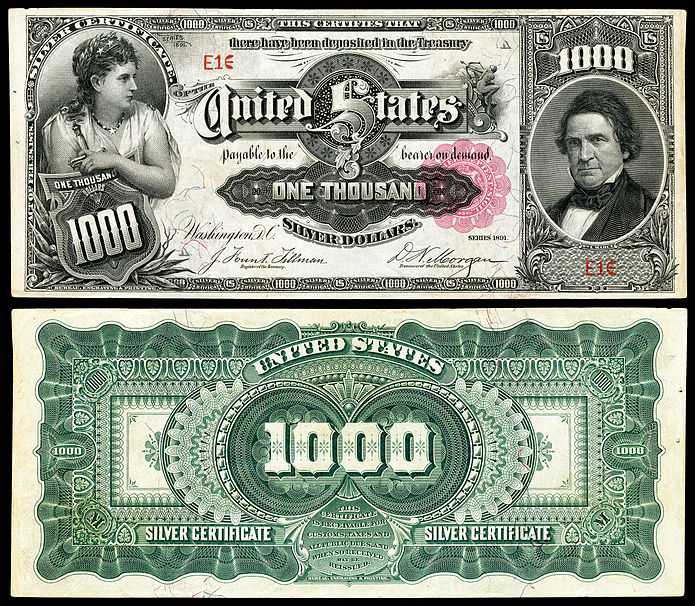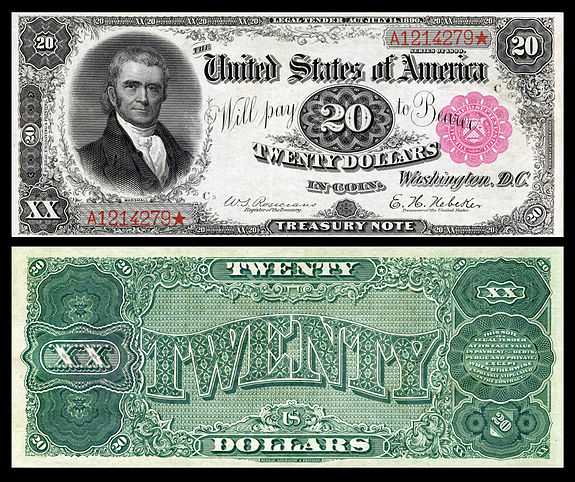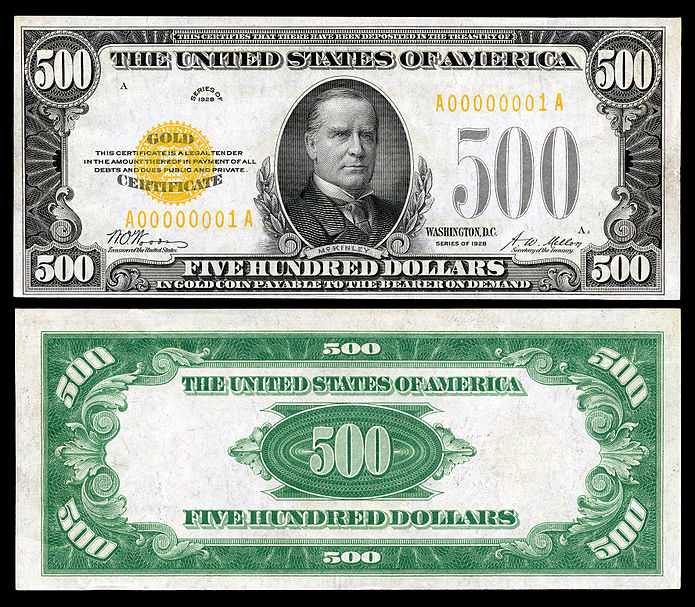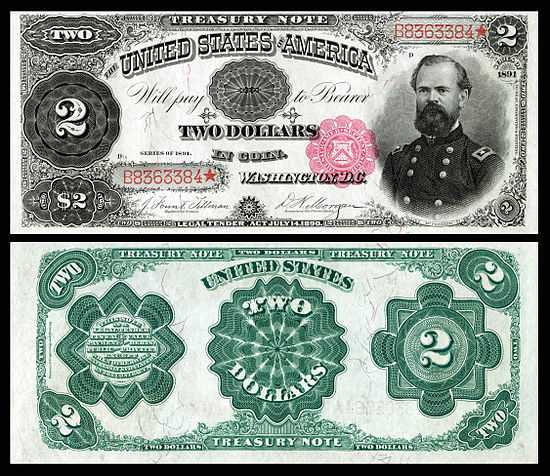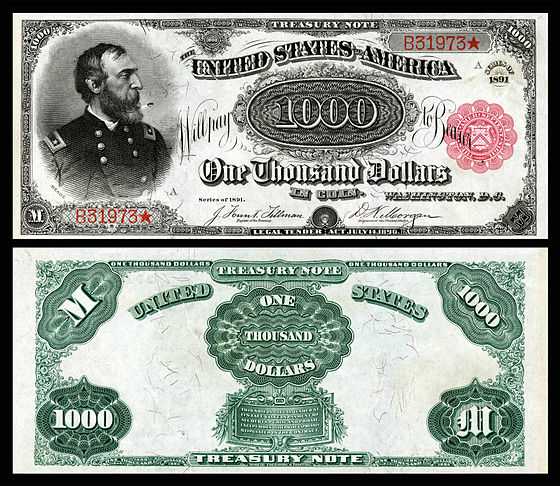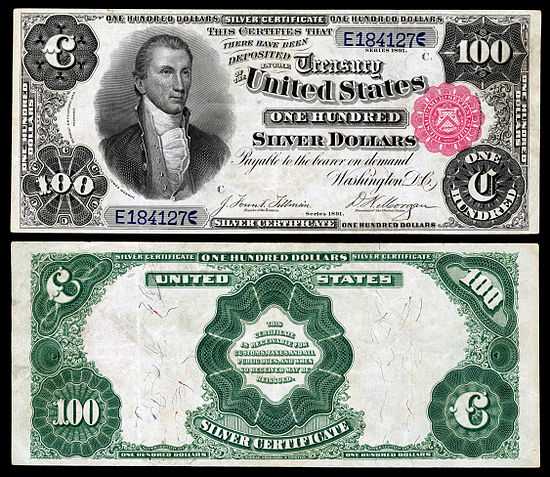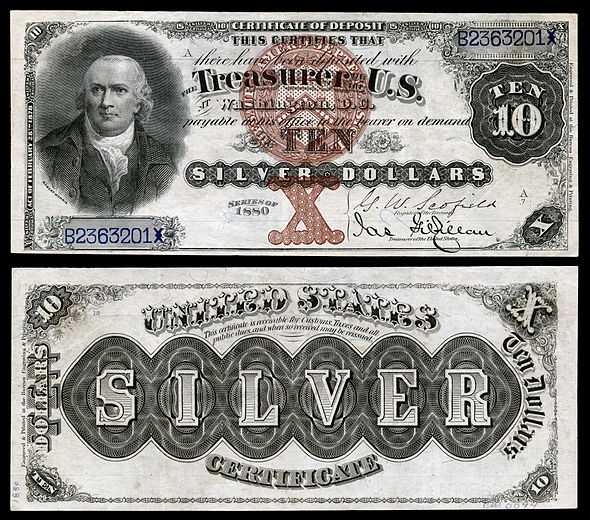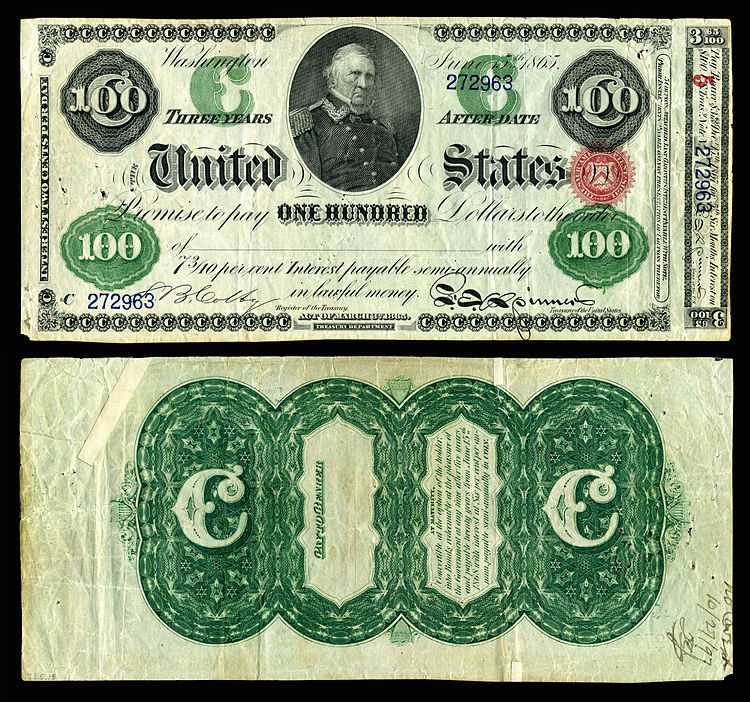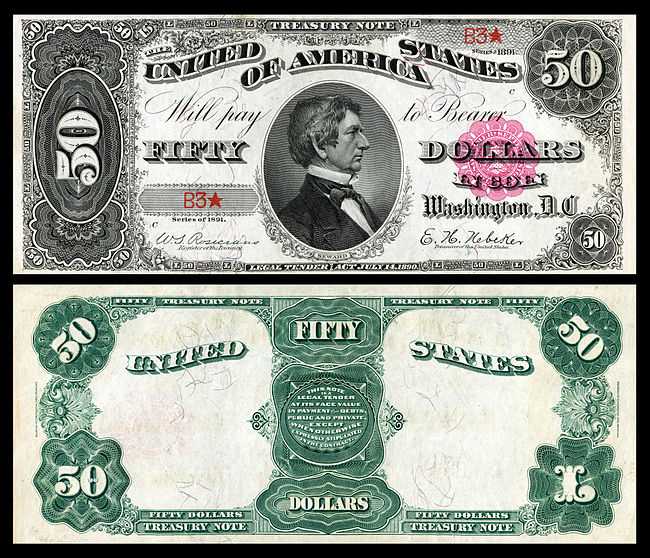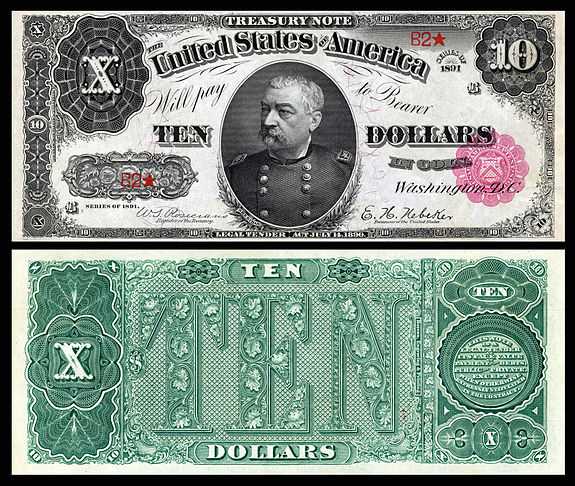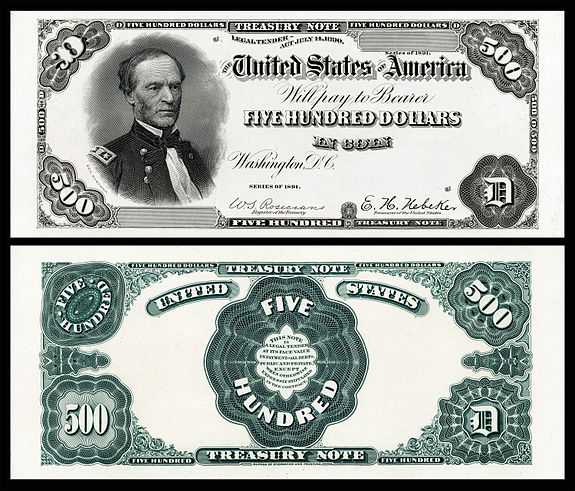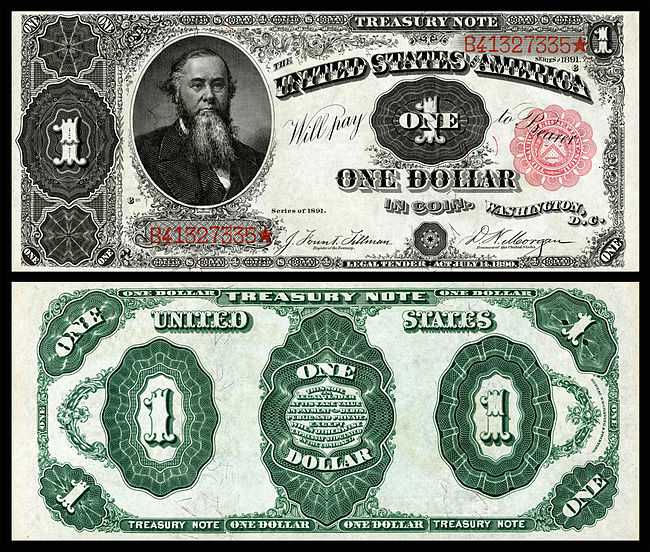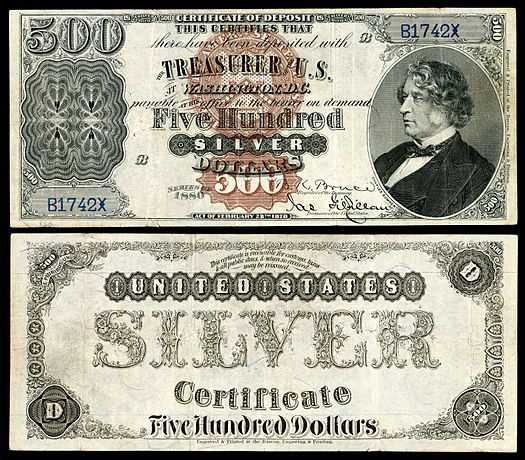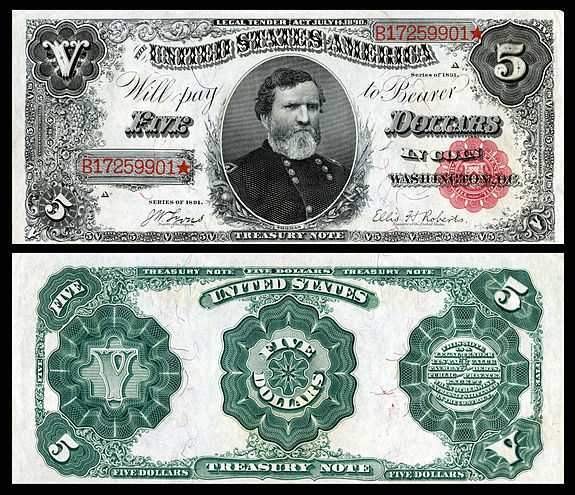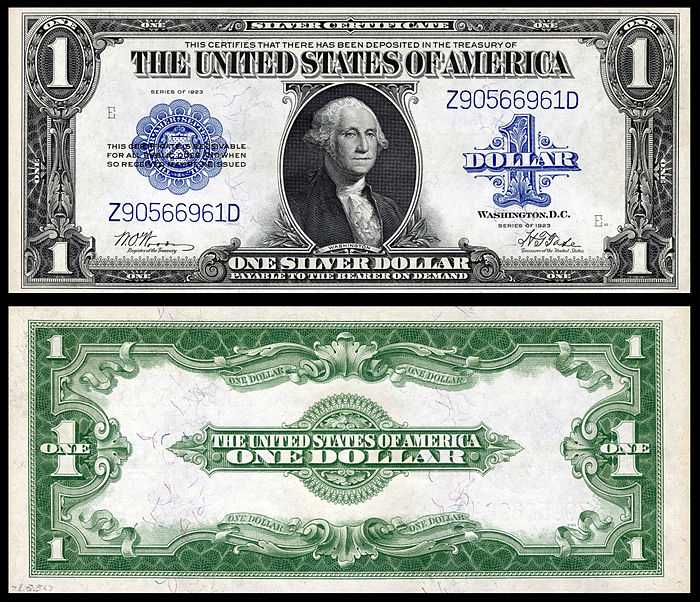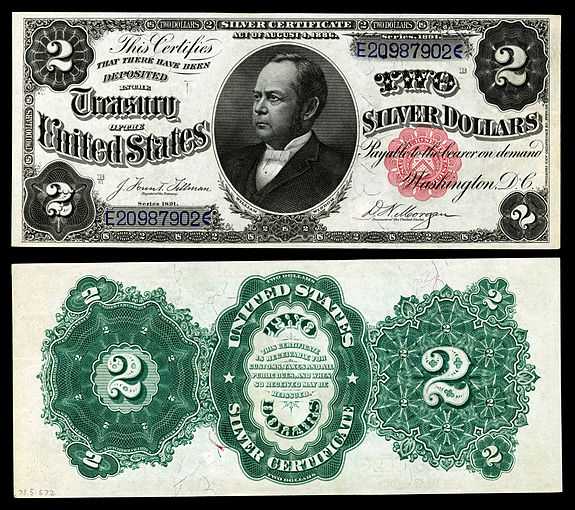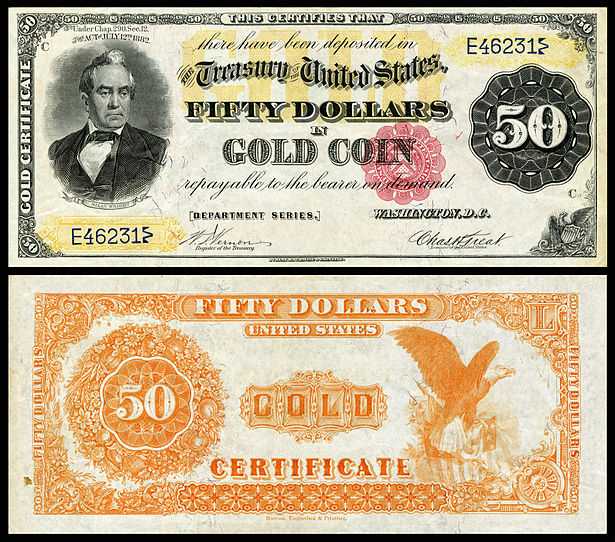List of people on United States banknotes
Individual portraits of 53 people central to the history of the United States are depicted on the country's banknotes[1][nb 1] including presidents, cabinet members, members of Congress, Founding Fathers, jurists, and military leaders. The Secretary of the Treasury was given broad latitude by Congress in 1862 to supervise the design, printing, and issue of banknotes.[nb 2][4] The Secretary, with input from the Bureau of Engraving and Printing, has final approval over the design of banknotes.[nb 3]
The redesign of U.S. banknotes in 1922 prompted the Treasury Department to review the portraits on banknotes and conclude that "portraits of Presidents of the United States have a more permanent familiarity in the minds of the public than any others."[6] Exceptions were made for Alexander Hamilton, Salmon Chase, and Benjamin Franklin. There have been no changes in the people depicted on currency intended for the general public since 1928; when Woodrow Wilson was depicted on the 1934 $100,000 gold certificate, the note was only for internal Treasury and Federal Reserve Bank use.
Five people have been depicted on U.S. currency during their lifetime. Abraham Lincoln was portrayed on the 1861 $10 Demand Note; Salmon Chase, Lincoln's Secretary of the Treasury, approved his own portrait for the 1862 $1 Legal Tender Note; Winfield Scott was depicted on Interest Bearing Notes during the early 1860s; and Francis Spinner and Spencer Clark both approved the use of their own image on fractional currency. In 1873, driven in large part by the actions of Spinner and Clark, Congress prohibited the use of portraits of living people on any U.S. bond, security, note, or fractional or postal currency.[7]
Key to banknote type abbreviations
Many of the 53 individuals were depicted on more than one note of a series or denomination. In the description of the banknotes, the date in parentheses indicates the individual’s first appearance on a given note type and denomination. When multiple banknotes are listed, the order, though seeming random, is in accordance with the Friedberg Number,[1] in ascending Friedberg order.[nb 4][nb 5] The engraved portraits are from a virtual exhibit of bank notes[9] which are part of the National Numismatic Collection at the Smithsonian Institution.
| Abbr | Note type | Note size |
|---|---|---|
| DN | Demand Note | Large |
| LT | Legal Tender | Large |
| CITN | Compound Interest Treasury Note | Exception |
| IBN | Interest Bearing Note | Exception |
| RC | Refunding Certificate | Exception |
| SC | Silver Certificate | Large |
| TN | Treasury Note | Large |
| NBN | National Bank Note | Large |
| FRBN | Federal Reserve Bank Note | Large |
| FRN | Federal Reserve Note | Large |
| GC | Gold Certificate | Large |
| SSN | Small Size Banknote | Small |
People depicted
Each of the 53 individuals depicted on U.S. banknotes (not including fractional currency) is listed alphabetically with their most commonly associated titles, positions held, or affiliations (with dates). Elected and appointed government positions are fairly comprehensive and positions are presented in ascending chronological order.
| Name | Born | Died | Portrait[nb 6] | Title/comments | U.S. Banknote(s)[10] | IAD[11] |
|---|---|---|---|---|---|---|
| John Quincy Adams[12] | 11 Jul 1767 | 23 Feb 1848 | |
U.S. Minister to the Netherlands (1794–97), Prussia (1797–1801); State Senate (Massachusetts, 1802); U.S. Senate (Massachusetts, 1803–08); U.S. Minister to Russia (1809–14), Great Britain (1815–17); U.S. Secretary of State (1817–25); President of the United States (1825–29); U.S. House (Massachusetts, 1831–48).[13] | LT $500 (1869) | 1869 |
| Thomas Hart Benton[14] | 14 Mar 1782 | 10 Apr 1858 | |
U.S. Senate (Missouri, 1821–51); U.S. House (Missouri, 1853–55). | GC $100 (1870) | 1870 |
| Salmon Portland Chase[15] | 13 Jan 1808 | 7 May 1873 | U.S. Senate (Ohio, 1849–55 & 1861); Governor (Ohio, 1856–60); U.S. Secretary of the Treasury (1861–64); Chief Justice of the Supreme Court (1864–73). |
LT $1 (1862) |
1861 | |
| William Clark | 1 Aug 1770 | 1 Sep 1838 | Explorer Captain, U.S. Army (1789–96); Superintendent of Indian Affairs (1807–13 & 1822–38);[16] Governor, Missouri Territory (1813–20).[17] |
LT $10 (1901) |
1901 | |
| Henry Clay[18] | 12 Apr 1777 | 29 Jun 1852 | State House (Kentucky, 1803); U.S. Senate (Kentucky, 1806–07 & 1810–11); Speaker of the House (1811–14, 1815–20, 1823–25); U.S. Secretary of State (1825–29); U.S. Senate (Kentucky, 1831–43 & 1849–52).[19] |
LT $50 (1869) |
1869 | |
| Grover Cleveland[20] | 18 Mar 1837 | 24 Jun 1908 | Governor (New York, 1883–85); President of the United States (1885–89, 1893–97). |
FRBN $20 (1915) |
1914 | |
| DeWitt Clinton[21] | 2 Mar 1769 | 11 Feb 1828 | State House (New York, 1797–98); State Senate, (New York, 1798–1802 & 1805–11); U.S. Senate (New York, 1802–03); Mayor, New York City (1803–07, 1808-1810 & 1811-15); Lieutenant Governor (New York, 1811–13); Candidate for President (1812); Governor (New York, 1817–23, 1825–28).[22] |
LT $1,000 (1869) |
1869 | |
| Stephen Decatur[23] | 5 Jan 1779 | 22 Mar 1820 | Commodore, U.S. Navy; Quasi-War, First Barbary War; Awarded Congressional Gold Medal (1813). |
SC $20 (1878) |
1878 | |
| Edward Everett[24] | 11 Apr 1794 | 15 Jan 1865 | U.S. House (Massachusetts, 1825–35); Governor (Massachusetts, 1836–40); U.S. Minister to Great Britain (1841–45); U.S. Secretary of State (1852–53); U.S. Senate (Massachusetts, 1853–54). |
SC $50 (1878) |
1878 | |
| David Glasgow Farragut[25] | 5 Jul 1801 | 14 Aug 1870 | Admiral, Commander-in-Chief (1861–70),[26] U.S. Navy (1810–1868); War of 1812, West Indies, American Civil War; Received Thanks of Congress (1862[26] & 1866).[26] |
TN $100 (1890) |
1890 | |
| William Pitt Fessenden[27] | 16 Oct 1806 | 8 Sep 1869 | .jpg) |
State House (Maine, 1832, 1840, 1845–46, 1853–54); U.S. House (Maine, 1841–43); U.S. Senate (Maine, 1854–64); U.S. Secretary of the Treasury (1864–65).[28] |
NBN $20 (1882, reverse) |
1882[29] |
| Benjamin Franklin[30] | 17 Jan 1706 | 17 Apr 1790 | Founder; Delegate, Pennsylvania, Continental Congress; U.S. Postmaster General (1775, Inaugural Holder); Signer, Declaration of Independence (1776); U.S. Minister to France (1778–85), Sweden (1782–83); President of Pennsylvania (1785–88); Delegate, Pennsylvania, U.S. Constitutional Convention (1787). |
LT $50 (1874) |
1874 | |
| Robert Fulton[31] | 14 Nov 1765 | 24 Feb 1815 | Engineer; Inventor |
SC $2 (1896, reverse) |
1896 | |
| Albert Gallatin[32] | 29 Jan 1761 | 12 Aug 1849 | State House (Pennsylvania, 1790–92); U.S. Senate (Pennsylvania, 1793–94); U.S. House (Pennsylvania, 1795–1801); U.S. Secretary of the Treasury (1801–14); U.S. Minister to France (1815–23), Great Britain (1826–27).[33] |
LT $500 (1862) |
1862 | |
| James Abram Garfield[34] | 19 Nov 1831 | 19 Sep 1881 | State Senate, (Ohio, 1859–61);[35] Major General, U.S. Army, (1861–63);[36] U.S. House (Ohio, 1863–81); President of the United States (1881). Shot by Charles J. Guiteau on 2 July 1881.[37] |
NBN $5 (1882) |
1882 | |
| Ulysses Simpson Grant[38] | 27 Apr 1822 | 23 Jul 1885 | Commanding General (1864–69), U.S. Army (1843–54, 1861–69 & 1877–85); U.S. Secretary of War, (Interim, 12 August 1867 – 12 January 1868);[39] President of the United States (1869–77) Mexican-American War, American Civil War; Received Thanks of Congress (1863) and awarded The Congressional Gold Medal(1863).[40] |
SC $1 (1899) |
1886 | |
| Alexander Hamilton[41] | 11 Jan 1757 | 12 Jul 1804 | Founder; Lieutenant Colonel, Continental Army (1775–); Continental Congress (1782–83); State House (New York, 1787); U.S. Secretary of the Treasury (1789–95); Major General, Senior Officer, U.S. Army (1799–1800).[42] |
DN $5 (1861) |
1861 | |
| Winfield Scott Hancock[43] | 14 Feb 1824 | 9 Feb 1886 | Major General (1866–86), U.S. Army (1844–86); Mexican-American War, American Civil War. Received Thanks of Congress (1866);[44] Candidate for President (1880). |
SC $2 (1886) |
1886 | |
| Benjamin Harrison[45] | 20 Aug 1833 | 13 Mar 1901 | .jpg) |
Brigadier General, U.S. Army (1862–65);[46] U.S. Senate (Indiana, 1881–87); President of the United States (1889–93). |
NBN $5 (1902) |
1902 |
| Thomas Andrews Hendricks[47] | 7 Sep 1819 | 25 Nov 1885 | State House (Indiana, 1848–49); U.S. House (Indiana, 1851–55); Assistant Treasurer of the United States (1853); U.S. Senate (Indiana, 1863–69); Governor (Indiana, 1873–77); Vice President of the United States (1885, Died in Office).[48] |
SC $10 (1886) |
1886 | |
| Michael Hillegas[49] | 22 Apr 1729 | 29 Sep 1804 | Provincial Assembly (Pennsylvania, 1765–75); Treasurer of the United States (1775–89, Inaugural Holder). |
GC $10 (1907) |
1907 | |
| Andrew Jackson[50] | 15 Mar 1767 | 8 Jun 1845 | U.S. House (Tennessee, 1796–97); U.S. Senate (Tennessee, 1797–98); Judge, Tennessee Supreme Court (1798–1804); Major General, U.S. Army, Awarded Congressional Gold Medal(1815); Military Governor of Florida (10 March 1821 – 18 July 1821); U.S. Senate (Tennessee, 1823–25); President of the United States (1829–37). An assassination attempt (the first on a U.S. President) was made by Richard Lawrence on 30 January 1835 outside the Capitol building.[51] |
LT $5 (1869) |
1861 | |
| Thomas Jefferson[52] | 13 Apr 1743 | 4 Jul 1826 | Founder; House of Burgesses (Virginia, 1769); Delegate, Virginia Continental Congress (1775–76 & 1783–84); Signer, Declaration of Independence (1776); Governor (Virginia, 1779–81); U.S. Minister to France (1785–89); U.S. Secretary of State (1790–93, Inaugural Holder ); Candidate for President (1796); Vice President of the United States (1797–1801); President of the United States (1801–09). |
LT $2 (1869) |
1869 | |
| John Jay Knox, Jr. [53] | 19 Mar 1828 | 12 Feb 1892 | .jpg) |
Comptroller of the Currency, Department of the Treasury (1872–84).[54] |
NBN $100 (1902) |
1902 |
| Meriwether Lewis[55] | 18 Aug 1774 | 11 Oct 1809 | Explorer; Governor, Louisiana/Missouri Territory (1807–09).[56] |
LT $10 (1901) |
1901 | |
| Abraham Lincoln[57] | 12 Feb 1809 | 15 Apr 1865 | State House (Illinois, 1834–41); U.S. House (Illinois, 1847–49); President of the United States (1861–65).[58] Assassinated by John Wilkes Booth on 15 April 1865.[59] |
DN $1 (1861) |
1861 | |
| James Madison[60] | 16 Mar 1751 | 28 Jun 1836 | Founder; Member, First General Assembly of Virginia (1776); Delegate, Virginia, Continental Congress (1780–83 & 1786–88); Virginia House of Delegates (1783–86); U.S. Constitutional Convention (1787); U.S. House (Virginia, 1789–97); U.S. Secretary of State (1801–09); President of the United States (1809–17). |
LT $5,000 (1878) |
1870 | |
| Daniel Manning | 16 May 1831 | 24 Dec 1887 | U.S. Secretary of the Treasury (1885–87) |
SC $20 (1886) |
1886 | |
| Joseph King Fenno Mansfield[61] | 22 Dec 1803 | 18 Sep 1862 | Major General (1862), U.S. Army (1822–62); Mexican-American War, American Civil War. |
LT $500 (1874) |
1874 | |
| William Learned Marcy[62] | 12 Dec 1786 | 4 Jul 1857 | Adjutant General, New York State Militia (1821–23); New York State Comptroller (1823); Judge, New York Supreme Court (1829–31); U.S. Senate (New York, 1831–33); Governor (New York, 1833–39); Commissioner of Mexican Claims (1839–42); U.S. Secretary of War (1845–49); U.S. Secretary of State (1853–57).[63] |
SC $1,000 (1878) |
1878 | |
| John Marshall[64] | 24 Sep 1755 | 6 Jul 1835 | Captain, Continental Army (1776–81);[65] Virginia General Assembly (1782–91, 1797); U.S. Minister to France (1797); U.S. House (Virginia, 1799–1800); U.S. Secretary of State (1800–01); Chief Justice of the Supreme Court (1801–35). |
TN $20 (1890) |
1890 | |
| Hugh McCulloch[66] | 7 Dec 1801 | 24 May 1895 | .jpg) |
Comptroller of the Currency (1863–65); U.S. Secretary of the Treasury (1865–69 & 1884–85). |
NBN $20 (1902) |
1902 |
| William McKinley, Jr.[67] | 29 Jan 1843 | 14 Sep 1901 | Major, U.S. Army (1861–65); U.S. House (Ohio, 1877–84 & 1885–91); Governor (Ohio, 1892–96);[68] President of the United States (1897–1901). Shot by Leon Czolgosz on 6 September 1901.[69] |
NBN $10 (1902) |
1902 | |
| James Birdseye McPherson[70] | 14 Nov 1828 | 22 Jul 1864 | Major General (1862–64), U.S. Army (1853–64), American Civil War; Killed in battle.[71] |
TN $2 (1890) |
1890 | |
| George Gordon Meade[72] | 31 Dec 1815 | 6 Nov 1872 | Major General (1862–69), U.S. Army (1835–69); Mexican-American War, American Civil War; Received Thanks of Congress (1864).[73] |
TN $1,000 (1890) |
1890 | |
| James Monroe[74] | 28 Apr 1758 | 4 Jul 1831 | Major, Continental Army (1776–79); Colonel, Virginia State Militia (1780);[75] Continental Congress (1783–86); State House (Virginia, 1786 & 1810–11); U.S. Senate (Virginia, 1790–94); U.S. Minister to France (1794–96); Governor (Virginia, 1799–1802 & 1811); U.S. Minister to Great Britain (1803–07); U.S. Secretary of State (1811–14 & 1815–17); U.S. Secretary of War (Interim, 27 August 1814 – 15 March 1815);[76] President of the United States (1817–25). |
SC $100 (1878) |
1878 | |
| Robert Morris[77] | 31 Jan 1734 | 8 May 1806 | Founder; Delegate, Pennsylvania, Continental Congress (1776); Signer, Declaration of Independence (1776); State House (Pennsylvania, 1778–81 & 1785–87); United States Superintendent of Finance (1781–84). |
LT $1,000 (1862) |
1862 | |
| Samuel Finley Breese Morse [78] | 27 Apr 1791 | 2 Apr 1872 | Inventor,[79] Morse Telegraph; Co-Inventor, Morse Code; Painter.[80] |
SC $2 (1896, reverse) |
1896 | |
| Running Antelope | c.1821 | c.1896 | Sioux Chief of the Hunkpapa |
SC $5 (1899) |
1899 | |
| Winfield Scott[81] | 13 Jun 1786 | 29 May 1866 | Commanding General (1841–61), U.S. Army (1808–61); War of 1812, Seminole Wars, Black Hawk War, Mexican-American War, American Civil War; Military Governor, Mexico City (1847–48); U.S. Secretary of War (Interim, 24 July 1850 – 15 August 1850);[82] Candidate for President (1852). Awarded Congressional Gold Medal (1814[83] and 1848).[83] |
IBN $500 [Two-Year] (1861) |
1861 | |
| William Henry Seward[84] | 16 May 1801 | 16 Oct 1872 | State Senate (New York, 1831–34); Governor (New York, 1839–43); U.S. Senate (New York, 1849–61);[85] U.S. Secretary of State (1861–69). An assassination attempt was made by Lewis Powell, a co-conspirator of John Wilkes Booth, the same night President Lincoln was shot (15 April 1865).[86] |
TN $50 (1891) |
1891 | |
| Philip Henry Sheridan[87] | 6 Mar 1831 | 5 Aug 1888 | Commanding General (1883–88), U.S. Army (1853–88); American Civil War, Indian Wars. Received Thanks of Congress (1865).[87] |
SC $5 (1896, reverse) |
1890 | |
| John Sherman[88] | 10 May 1823 | 22 Oct 1900 | .jpg) |
U.S. House (Ohio, 1855–61); U.S. Senate (Ohio, 1861–77 & 1881–97); President pro tem, U.S. Senate (1885–87);[89] U.S. Secretary of the Treasury (1877–81); U.S. Secretary of State (1897–98). |
NBN $50 (1902) |
1902 |
| William Tecumseh Sherman[90] | 8 Feb 1820 | 14 Feb 1891 | U.S. Secretary of War (Interim, 9 September 1869 – 18 October 1869);[89] Commanding General (1869–83), U.S. Army (1840–84); American Civil War, Indian Wars. Received Thanks of Congress (1864[91] & 1865).[91] |
TN $500 (1891) |
1891[92] | |
| Edwin McMasters Stanton[93] | 19 Dec 1814 | 24 Dec 1869 | U.S. Attorney General (1860–61); U.S. Secretary of War (1862–68); U.S. Supreme Court (appointed 1869, died before taking office).[93] |
TN $1 (1890) |
1890 | |
| Charles Sumner[94] | 6 Jan 1811 | 11 Mar 1874 | U.S. Senate (Massachusetts, 1851–74). |
SC $500 (1878) |
1878 | |
| George H. Thomas[95] | 31 Jul 1816 | 28 Mar 1870 | Major General (1864–70), U.S. Army (1840–70); Mexican-American War, American Civil War. Received Thanks of Congress (1865).[96] |
TN $5 (1890) |
1890 | |
| George Washington[97] | 22 Feb 1732 | 14 Dec 1799 | Founder; Virginia House of Burgesses (1758–75);[98] Delegate, VA, Continental Congress (1774–75); Commander-in-Chief, Continental Army (1775–83);[99] Member, U.S. Constitutional Convention (1787); President of the United States (1789–97); Lieutenant General, Commander of the United States Army (1798–99).[100] |
LT $1 (1869) |
1861 | |
| Martha Washington[101] | 2 Jun 1731 | 22 May 1802 | First Lady of the United States (1789–97). |
SC $1 (1886) |
1886 | |
| Daniel Webster[102] | 18 Jan 1782 | 24 Oct 1852 | .jpg) |
U.S. House (New Hampshire, 1813–17); U.S. House (Massachusetts, 1823–27); U.S. Senate (Massachusetts, 1827–41 & 1845–50); Candidate for President (1836); U.S. Secretary of State (1841–43 & 1850–52).[103] |
LT $10 (1869) |
1869 |
| Woodrow Wilson[104] | 28 Dec 1856 | 3 Feb 1924 | .jpg) |
Governor (New Jersey, 1911–13); President of the United States (1913–21). Recipient of the Nobel Peace Prize (1919).[105] |
SSN $100,000 (1934) |
1934 |
| William Windom[106] | 10 May 1827 | 29 Jan 1891 | U.S. House (Minnesota, 1859–69); U.S. Senate (Minnesota, 1870–71, 1871–81 & 1881–83); U.S. Secretary of the Treasury (1881, 1889–91).[104] |
SC $2 (1891) |
1891 | |
| Silas Wright, Jr.[107] | 24 May 1795 | 27 Aug 1847 | U.S. House (New York, 1827–29 & 1829–30); U.S. Senate (New York, 1833–44); Governor (New York, 1845–47). |
GC $50 (1882) |
1882 |
Summary of titles/positions
Below is a summary of the titles/positions held, at one time or another, by the 53 individuals depicted on United States banknotes from 1861 to the present. The list of positions is not exhaustive, but does address the central elected federal and state officials, members of the President’s cabinet, military figureheads, and several of the founders and framers of the United States government.
Fifty-three people held at least 132 elected and appointed positions for a cumulative total of over 763 years of public service.
| Position/title | No. people |
|---|---|
| President of the United States | 13 |
| Vice President | 2 |
| Speaker of the House | 1 |
| President pro tem | 1 |
| Secretary of State | 11 |
| Secretary of the Treasury | 8 |
| Secretary of War | 3 |
| Attorney General | 1 |
| United States Senate | 20 |
| United States House | 17 |
| State Senate | 6 |
| State House | 11 |
| Governor | 15 |
| Delegate, Continental Congress | 7 |
| Signer, Declaration of Independence | 3 |
| Member, U.S. Constitutional Convention | 5 |
| Commanding General | 6 |
| Supreme Court | 2 |
References
Footnotes
- ↑ The scope of U.S. banknotes (e.g., 1861 to the present) is based on the parameters established by the Friedberg reference book.[2]
- ↑ An Act to Authorize the Issue of United States Notes, and for the Redemption or Funding Thereof, and for Funding the Floating Debt of the United States. Feb 25, 1862 Vol. XII, p.345 (original).[3]
- ↑ Placement of an individual on a banknote by an Act of Congress supersedes Treasury Department approval.[5]
- ↑ Large size notes represent the earlier types or series of U.S. banknotes. Their "average" dimension is 7.375 x 3.125 inches (187 x 79 mm). Small size notes (described as such due to their size relative to the earlier large size notes) are an "average" 6.125 x 2.625 inches (156 x 67 mm), the size of modern U.S. currency. "Each measurement is +/- 0.08 inches (2mm) to account for margins and cutting".[8]
- ↑ Exceptions to the large versus small categories are the CITN, IBN, and RC, all slightly larger than the large size note dimensions.
- ↑ Clicking on the majority of the portraits will reveal the entire note.
Notes
- ↑ 1.0 1.1 Friedberg
- ↑ Friedberg, Arthur L. & Ira S.
- ↑ "Laws of the United States Relating to Loans and the Currency Including the Coinage Acts". Treasury Department, p. 45.
- ↑ U.S. Currency, Bureau of Engraving and Printing, retrieved 15 March 2013
- ↑ Portraits & Designs, U.S. Treasury Website, retrieved 30 December 2012
- ↑ U.S. Currency, Bureau of Engraving and Printing, retrieved 11 April 2013
- ↑ "Laws of the United States Relating to Loans and the Currency Including the Coinage Acts". Treasury Department, p. 128.
- ↑ Friedberg, p. 7.
- ↑ Portraits on U.S. Bank Notes, The National Currency Foundation, retrieved 25 December 2012
- ↑ Treasury Collection Highlights: Part 1, The National Currency Foundation, retrieved 29 December 2012
- ↑ IAD (Initial Appearance Date) indicates each individual's earliest appearance on the scope of U.S. banknotes covered by this list.
- ↑ Adams, John Quincy, (1767–1848), Biographical Directory of the United States Congress, retrieved 29 December 2012
- ↑ Sobel, p. 6.
- ↑ Benton, Thomas Hart, (1782–1858), Biographical Directory of the United States Congress, retrieved 29 December 2012
- ↑ Chase, Salmon Portland, (1808–1873), Biographical Directory of the United States Congress, retrieved 29 December 2012
- ↑ William Clark informs Indian nations that the U.S. has won the war., Wisconsin Historical Society, retrieved 1 January 2013
- ↑ Kansas Historical Quarterly - William Clark's Diary, Kansas Historical Society, retrieved 1 January 2013
- ↑ Clay, Henry, (1777–1852), Biographical Directory of the United States Congress, retrieved 29 December 2012
- ↑ Sobel, p. 71.
- ↑ Sobel, p. 72.
- ↑ Clinton, De Witt (1769–1828), Biographical Directory of the United States Congress, retrieved 7 February 2013
- ↑ Clinton, DeWitt, (1769–1828), Biographical Directory of the United States Congress, retrieved 29 December 2012
- ↑ The Biography of the Principal American Military and Naval Heroes, Applewood Books, Bedford MA, retrieved 30 December 2012
- ↑ Everett, Edward, (1794–1865), Biographical Directory of the United States Congress, retrieved 29 December 2012
- ↑ Eicher, John H. & David J., p. 229.
- ↑ 26.0 26.1 26.2 Eicher, John H. & David J., p. 230.
- ↑ Fessenden, William Pitt, (1806–1869), Biographical Directory of the United States Congress, retrieved 29 December 2012
- ↑ Sobel, p. 124.
- ↑ Although the $20 1882 Date Back and Value Back National Bank Notes carry a series date of 1882, they were not issued/released until the late 1880s to early 1890s.
- ↑ Franklin, Benjamin, (1706–1790), Biographical Directory of the United States Congress, retrieved 29 December 2012
- ↑ Robert Fulton: A Symbol of the American Dream, Fordham University, retrieved 30 December 2012
- ↑ Gallatin, Albert, (1761–1849), Biographical Directory of the United States Congress, retrieved 29 December 2012
- ↑ Sobel, p. 139.
- ↑ Garfield, James Abram, (1831–1881), Biographical Directory of the United States Congress, retrieved 29 December 2012
- ↑ Sobel, p. 140.
- ↑ Eicher, John H. & David J., p. 247.
- ↑ A Great Nation in Grief, The New York Times, 3 July 1881, retrieved 22 December 2012
- ↑ Eicher, John H. & David J., p. 264.
- ↑ Sobel, p. 153.
- ↑ Eicher, John H. & David J., p. 265.
- ↑ Hamilton, Alexander, (1757–1804), Biographical Directory of the United States Congress, retrieved 29 December 2012
- ↑ Heitman, p. 269.
- ↑ Eicher, John H. & David J., p. 275.
- ↑ Eicher, John H. & David J., p. 276.
- ↑ Harrison, Benjamin (1833–1901), Biographical Directory of the United States Congress, retrieved 29 December 2012
- ↑ Eicher, John H. & David J., p. 281.
- ↑ Hendricks, Thomas Andrews, (1819–1885), Biographical Directory of the United States Congress, retrieved 29 December 2012
- ↑ Sobel, p. 172.
- ↑ Michael Hillegas, The Pennsylvania Magazine of History and Biography, retrieved 30 December 2012
- ↑ Jackson, Andrew, (1767–1845), Biographical Directory of the United States Congress, retrieved 29 December 2012
- ↑ Life and Death in the White House, National Museum of American History, retrieved 29 December 2012
- ↑ Jefferson, Thomas, (1743–1826), Biographical Directory of the United States Congress, retrieved 29 December 2012
- ↑ Knox Family, Rutherford B. Hayes Presidential Center, retrieved 30 December 2012
- ↑ John Jay Knox, Office of the Comptroller of the Currency, retrieved 30 December 2012
- ↑ Lewis & Clark, National Park Service, retrieved 30 December 2012
- ↑ Lewis and Clark: The Journey Ends, Smithsonianmag.com, retrieved 1 January 2013
- ↑ Lincoln, Abraham, (1809–1865), Biographical Directory of the United States Congress, retrieved 29 December 2012
- ↑ Sobel, p. 232.
- ↑ President Lincoln Shot by an Assassin, The New York Times, 15 April 1865, retrieved 22 December 2012
- ↑ Madison, James, Jr. ,(1751–1836), Biographical Directory of the United States Congress, retrieved 29 December 2012
- ↑ Eicher, John H. & David J., p. 361.
- ↑ Marcy, William Learned, (1786–1857), Biographical Directory of the United States Congress, retrieved 29 December 2012
- ↑ Sobel, p. 241.
- ↑ Marshall, John, (1755–1835), Biographical Directory of the United States Congress, retrieved 29 December 2012
- ↑ Heitman, p. 381.
- ↑ Sobel, p. 249.
- ↑ McKinley, William, Jr., (1843–1901), Biographical Directory of the United States Congress, retrieved 29 December 2012
- ↑ Sobel, p. 254.
- ↑ Nation Grieves at Loss of President, The New York Times, 15 September 1901, retrieved 22 December 2012
- ↑ Eicher, John H. & David J., p. 381.
- ↑ The Dead of 1864, The New York Times, 29 January 1865, retrieved 22 December 2012
- ↑ Eicher, John H. & David J., p. 382.
- ↑ Eicher, John H. & David J., p. 383.
- ↑ Monroe, James, (1758–1831), Biographical Directory of the United States Congress, retrieved 29 December 2012
- ↑ Heitman, p. 396.
- ↑ Heidler, David S. and Jeanne T. (2004). Encyclopedia of the War of 1812. Naval Institute Press. Annapolis, MD. ISBN 1-59114-362-4. P. 16.
- ↑ Morris, Robert, (1734–1806), Biographical Directory of the United States Congress, retrieved 29 December 2012
- ↑ Samuel F.B. Morse Papers, The Library of Congress, retrieved 30 December 2012
- ↑ Inventor of the Week – Samuel F.B. Morse, Lemelson-MIT, retrieved 30 December 2012
- ↑ Kennicott, Philip (5 July 2011), Samuel Morse’s painting "Gallery of the Louvre" on display at National Gallery, The Washington Post, retrieved 6 January 2013
- ↑ Eicher, John H. & David J., p. 473.
- ↑ Eicher, John H. & David J., p. 474.
- ↑ 83.0 83.1 Eicher, John H. & David J., pp. 473–474.
- ↑ Seward, William Henry, (1801–1872), Biographical Directory of the United States Congress, retrieved 29 December 2012
- ↑ Sobel, p. 326.
- ↑ The Attempt to Assassinate Seward, The New York Times, 14 March 1909, retrieved 6 January 2013
- ↑ 87.0 87.1 Eicher, John H. & David J., p. 481.
- ↑ Sherman, John, (1823–1900), Biographical Directory of the United States Congress, retrieved 29 December 2012
- ↑ 89.0 89.1 Sobel, p. 328.
- ↑ Eicher, John H. & David J., p. 482.
- ↑ 91.0 91.1 Eicher, John H. & David J., p. 484.
- ↑ The $500 1891 Treasury Note was designed, plates engraved, and proof certified and approved by the Bureau of Engraving and Printing. However, the issue was never released/circulated.
- ↑ 93.0 93.1 Sobel, p. 339.
- ↑ Sumner, Charles, (1811–1874), Biographical Directory of the United States Congress, retrieved 29 December 2012
- ↑ Eicher, John H. & David J., p. 525.
- ↑ Eicher, John H. & David J., pp. 525–526.
- ↑ Washington, George, (1732–1799), Biographical Directory of the United States Congress, retrieved 29 December 2012
- ↑ House of Burgesses, retrieved 1 January 2013
- ↑ Heitman, p. 571.
- ↑ Sobel, p. 375.
- ↑ First Lady Biography: Martha Washington, National First Ladies' Library, retrieved 30 December 2012
- ↑ Webster, Daniel, (1782–1852), Biographical Directory of the United States Congress, retrieved 29 December 2012
- ↑ Sobel, p. 378.
- ↑ 104.0 104.1 Sobel, p. 391.
- ↑ All Nobel Peace Prizes, Nobelprize.org, retrieved 6 January 2013
- ↑ Windom, William, (1827–1891), Biographical Directory of the United States Congress, retrieved 29 December 2012
- ↑ Wright, Silas, Jr., (1795–1847), Biographical Directory of the United States Congress, retrieved 29 December 2012
Bibliography
- Eicher, John H. and David J. (2001). Civil War High Commands Stanford, CA, Stanford University Press. ISBN 0-8047-3641-3.
- Friedberg, Arthur L. and Ira S. (2010). Paper Money of the United States, 19th Edition. Clifton, NJ, The Coin & Currency Institute, Inc. ISBN 0-87184-519-9.
- Heitman, Francis B. (1914). Historical Register of Officers of the Continental Army During The War of the Revolution. Washington, DC, The Rare Book Shop Publishing Company, Inc.
- Sobel, Robert, (ed.) (1990). Biographical Directory of the United States Executive Branch 1774–1989. Westport, CT, Greenwood Press. ISBN 0-313-26593-3.
